仁爱版英语七年级下第六单元复习题培训课件
2022-2023学年第二学期仁爱英语七年级下册Unit6复习课

语法加油站
重点知识点
• 1. in front of与in the front of的区别 • in front of 在……的前面(在范围之外的前面) • in the front of在……的前面(在范围内的前面) eg:
• There is a pool _in__f_ro_n__t _o_f_his house. (在...外面)
17. 在交通事故中___i_n__t_ra__ff_i_c__a_c_c_i_d_e__n_t_s_____ 18. 遵守交通规则___o__b_e_y__t_h_e__t_r_a_f_fi_c__r_u_l_e_s___ 19. 看两边 _________l_o_o__k_b__o_t_h__w__a_y_s_________ 20. 在街上玩________p_l_a_y__o_n__t_h_e__s_t_r_e_e_t______ 21. 我们所有人 _____a_l_l _o_f__u_s_________________ 22. 超速罚款单_____a__t_i_c_k_e_t__f_o_r_s__p_e_e__d_in__g___ 23. 不要迟到。_____D__o_n__’t__b_e__l_a_t_e_.__________ 24. 小心____________b_e__c__a_r_e_f_u_l_______________
9. 失去生命_______lo__s_e__o_n__e_’s__l_i_fe___________ 10. 需要做某事___n__e_e_d__t_o__d_o__s_t_h__. __________ 11. 保证安全 _____k_e_e_p___s_a_f_e_________________ 12. 换乘2路公交车c_h__a_n_g__e__to__t_h__e_N__o_._2__b_u__s__ 14. 受伤__________g_e__t/_b_e__h__u_r_t_______________ 15. 禁止右转。___N__o__r_ig__h_t_t_u__rn__._____________ 16. 禁止停车。___N__o__p_a_r_k__in__g_._______________
河南省平舆县第六初级中学仁爱版七年级英语下册课件:Unit6OurLocalArea-Topic1Thereisastudynexttomybedroom-SectionA(共22张PPT)
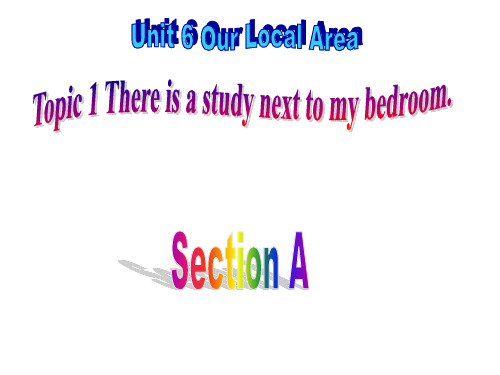
合作探究:
你会用 There is 或 There are 描述一 下自己的家或者教室吗?(比一比,看 哪组造的又对又多) eg: There is a computer in my study.
There are some books on the desk.
1.掌握生词和短语
on the first/ second floor next to come in
There be 句型
1. 肯定句: There is/are+主语+其它。 2. 否定句: There is/are+not+主语+其它。 3. 一般疑问句:
--Is/Are there+主语+其它? --Yes, there is/are. --No, there isn't/aren't.
There be 与 have/has 的区别
In the garden
What’s she doing? She is eating. Where is she?
in the dining room
What’s he doing? He is cooking. Where is he?
in the kitchen
What’s he doing? He is studying.
teacher, Mr. Li. 5. How many letters _a__r_e___t_h__e_r__e__ in this
word? 6. __I_s__t_h__e__r_e____ a river in front of the house?
There be 侧重 “存在关系”, 表示“某 地或某时间存在某人/某物” 。如: There is a book on the desk.
七年级下册英语仁爱版期末全册复习课件PPT

二、话题
1.天气及季节 2.学校生活〔交通〕 3.居住环境 4.生日
三、句型 〔及交际用语〕
1.某人用多长时间/多少钱做某事: It takes/took sb. + 时间/钱 + to do sth.
2. 提问时间:
What’s the time?
What time is it?
一、重点语法
1.动词时态 2.祈使句
动词时态
名称
特征词
肯定句的动词
一般现在 sometimes, usually, often always, every...,
现在进行 look, listen, now,
It’s ...〔几点了〕 . 后的
句子
原形 第三人称单数
be + doing
Don’t do sth. 后的句子 一般过去 yesterday..., just now,
7.提问温度:
What’s the temperature? How about the temperature?
8. 提问人的相貌:
What does...look like?
9. 提问人的性格:
What is ... like?
10.询问对方情况:
What’s wrong with sb.? What’s the matter with sb.?
...ago, this morning,
过去式
When I was young,
1.The twins ___w__a_s_h____〔wash〕 the
clothes every day.
2.Sometimes he __p_l_a_y__s_ 〔play〕
仁爱版七年级下册英语第6单元测试题
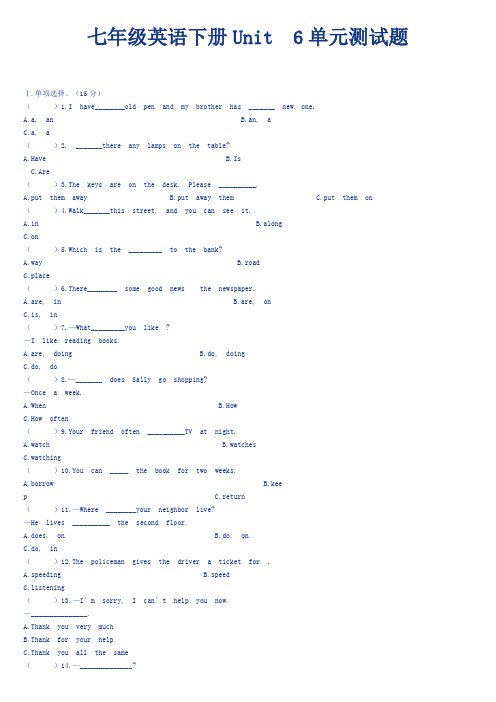
七年级英语下册Unit 6单元测试题Ⅰ.单项选择。
(15分)()1.I have________old pen and my brother has _______ new one.A.a, anB.an, aC.a, a()2. _______there any lamps on the table?A.HaveB.IsC.Are()3.The keys are on the desk. Please __________.A.put them awayB.put away themC.put them on()4.Walk_______this street, and you can see it.A.inB.alongC.on()5.Which is the _________ to the bank?A.wayB.roadC.place()6.There________ some good news the newspaper.A.are, inB.are, onC.is, in()7.—What_________you like ?—I like reading books.A.are, doingB.do, doingC.do, do()8.—_______ does Sally go shopping?—Once a week.A.WhenB.HowC.How often()9.Your friend often __________TV at night.A.watchB.watchesC.watching()10.You can _____ the book for two weeks.A.borrowB.keep C.return()11.—Where ________your neighbor live?—He lives __________ the second floor.A.does, onB.do, onC.do, in()12.The policeman gives the driver a ticket for .A.speedingB.speedC.listening()13.—I’m sorry, I can’t help you now.—_______________.A.Thank you very muchB.Thank for your helpC.Thank you all the same()14.—______________?—The kitchen fan doesn’t work.A.What’s matterB.What the matterC.What’s the matter()15.—What’s a tea house?—It’s a place where you can .A.eat mealsB.buy thingsC.drink teaⅡ.根据句意及汉语提示,完成下列句子。
仁爱版七年级英语课件
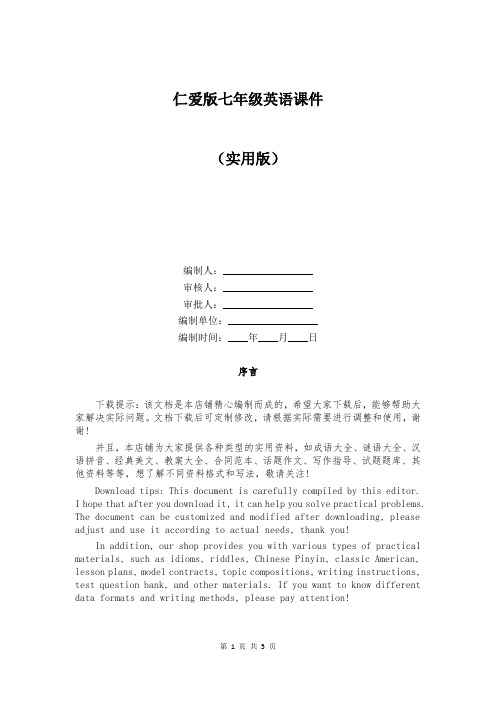
仁爱版七年级英语课件(实用版)编制人:__________________审核人:__________________审批人:__________________编制单位:__________________编制时间:____年____月____日序言下载提示:该文档是本店铺精心编制而成的,希望大家下载后,能够帮助大家解决实际问题。
文档下载后可定制修改,请根据实际需要进行调整和使用,谢谢!并且,本店铺为大家提供各种类型的实用资料,如成语大全、谜语大全、汉语拼音、经典美文、教案大全、合同范本、话题作文、写作指导、试题题库、其他资料等等,想了解不同资料格式和写法,敬请关注!Download tips: This document is carefully compiled by this editor.I hope that after you download it, it can help you solve practical problems. The document can be customized and modified after downloading, please adjust and use it according to actual needs, thank you!In addition, our shop provides you with various types of practical materials, such as idioms, riddles, Chinese Pinyin, classic American, lesson plans, model contracts, topic compositions, writing instructions, test question bank, and other materials. If you want to know different data formats and writing methods, please pay attention!仁爱版七年级英语课件一、说教材(一)教材的地位和作用:我今天要说的是初中牛津英语7A第一单元(This is me)中的第四课时的语法这一部分。
七年级英语下学期期中复习:Unit 5-Unit 6-仁爱版
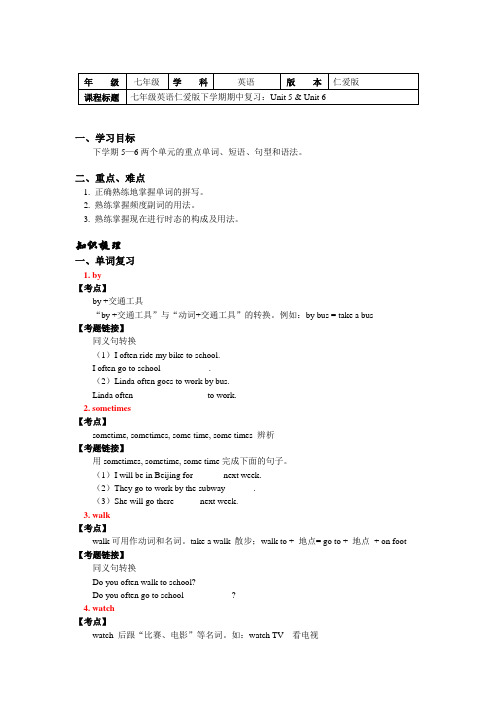
一、学习目标下学期5—6两个单元的重点单词、短语、句型和语法。
二、重点、难点1. 正确熟练地掌握单词的拼写。
2. 熟练掌握频度副词的用法。
3. 熟练掌握现在进行时态的构成及用法。
知识梳理一、单词复习1. by【考点】by +交通工具“by +交通工具”与“动词+交通工具”的转换。
例如:by bus = take a bus【考题链接】同义句转换(1)I often ride my bike to school.I often go to school _____ _____.(2)Linda often goes to work by bus.Linda often _____ _____ _____ to work.2. sometimes【考点】sometime, sometimes, some time, some times 辨析【考题链接】用sometimes, sometime, some time完成下面的句子。
(1)I will be in Beijing for ______ next week.(2)They go to work by the subway ______.(3)She will go there _____ next week.3. walk【考点】walk可用作动词和名词。
take a walk 散步;walk to + 地点= go to + 地点+ on foot 【考题链接】同义句转换Do you often walk to school?Do you often go to school _____ _____?4. watch【考点】watch 后跟“比赛、电影”等名词。
如:watch TV 看电视【考题链接】根据汉语提示完成句子。
(1)你经常看电视吗?Do you often _____ _____?(2)我们去看电影吧。
Let’s go and ____ ____ ____.5. listen【考点】listen 作不及物动词,listen to 听……(讲话);听从【考题链接】根据汉语提示完成句子。
仁爱版中考英语第一轮课本复习课件:七年级下册 Units 5—6

七年级下册 Units 5—6
1
目
录2
回归教材 知识梳理 综合训练
1
回归教材 知识梳理
返回首页
知识点1 频度副词的用法
I usually come to school on foot,but sometimes by bike.我通常步行 来学校,但是有时候骑自行车。(Unit 5 P3)
知识点1 知识点2 知识点3 知识点4 知识点5 知识点6 知识点7
how long how far how often how soon
1.— How often do you play basketball with your friends?
—Only once a week. 2.— How soon do you think we can finish the report?
直接跟宾语;across是介词,通常
和go,walk,swim等动词连用。
知识点1 知识点2 知识点3 知识点4 知识点5 知识点6 知识点7
返回首页
单词
含义及用法
介词,“穿过”,强调从空
间内部穿过(其含义常与介 through 词in有关),如穿过forest,
window等。
介词,“翻越;越过”,指
few,a few,little与a little都可以修饰名词,但意义与用法不同,具 体区别如下:
[做题步骤:一辨可不可数,二辨肯定或否]
肯定意义 a few一些;几个 a little一点儿;少量
知识点1 知识点2
否定意义 few几乎没有 little几乎没有
知识点3 知识点4 知识点5
所修饰名词 可数名词复数
Unit6Topic3单元复习课堂练习课件-仁爱版七年级英语下册

三、选择填空。
(C )1. In countries like the UK, people drive _______ the left.
A. in
B. at
C. on
三、选择填空。
( B )2. There is a park ________ from my home. Many people take a walk there.
一、翻译下列词组(或句子)。
5. 需要做某事 ______n__ee_d__t_o_d_o__s_th_.______ 6. 禁止停车。 ______N__o_p__a_rk__in_g_._________ 7. 禁止右转。 ______N__o_r_i_g_h_t_t_u_r_n_._______ 8. 红绿灯 __________t_r_a_ff_ic__li_g_h_t_s________
—It’s about 180 __k_i_lo_m__e_t_er_s__ (kilometer).
二、根据语境、音标或所给单词的提示完成句子, 每空一词。
3. We need to make a few small __c_h_a_n_g_e_s_ (change) to the report(报告). 4. Children’s lives are in __d_a_n_g_e_r___ /'deɪndʒə(r)/ every time they cross this road. 5. The park is open to the __p_u_b_l_ic__ /'pʌblɪk/ from morning till night.
三、选择填空。
(C )5. The sign(指示牌) A. No left turn B. No right turn C. No parking
仁爱英语七年级下册单元同步测试题Unit 6 Topic 1(含答案)
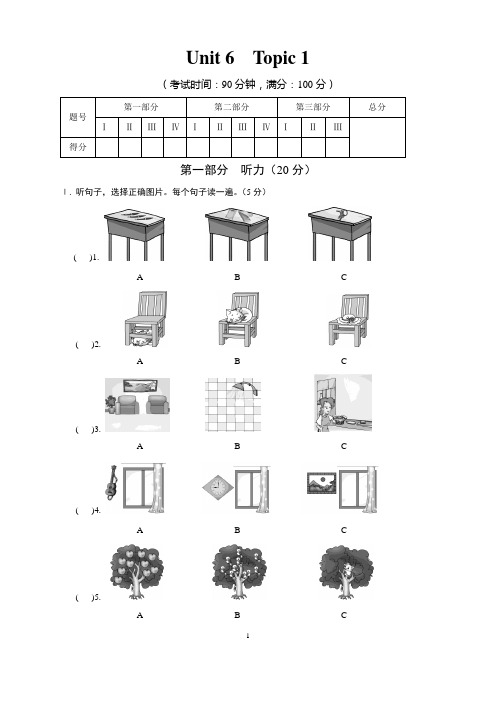
Unit 6 Topic 1(考试时间:90分钟,满分:100分)第一部分第二部分第三部分总分题号ⅠⅡⅢⅣⅠⅡⅢⅣⅠⅡⅢ得分第一部分听力(20分)Ⅰ. 听句子,选择正确图片。
每个句子读一遍。
(5分)( )1.A B C( )2.A B C( )3.A B C( )4.A B C( )5.A B CⅡ. 听句子,选择正确答语。
每个句子读一遍。
(5分)( )6. A. OK. B. Thank you. C. Sorry, I don’t know.( )7. A. Yes, they are. B. Yes, there are. C. Four chairs.( )8. A. Yes, there is. B. It’s my father’s.C. It’s in front of the house.( )9. A. Yes, there are two floors. B. Three floors. C. There is a house.( )10. A. Some model planes. B. Yes, there are some flowers over there.C. They are near the windows.Ⅲ. 听对话,选择正确答案。
每段对话读两遍。
(5分)( )11. How many students are there in the boy’s class?A. Fifty-two.B. Thirty.C. Twenty-two.( )12. How many boys are there in the class?A. Thirty-two.B. Thirty.C. Twenty-two.( )13. What’s on the table?A. A computer.B. Books.C. Pictures.( )14. Where are the pictures?A. On the table.B. On the desks.C. On the wall.( )15. Are there any computers on the students’ desks?A. Yes, there are.B. No, there aren’t.C. We don’t know.Ⅳ. 听短文,完成下列表格。
仁爱英语七年级下册期中复习Unit5-unit6情景交际和看图写话专项练习课件ppt

Excuse me, may I borrow your ruler ?
72.你想知道这些书你能借多久,可以这样问:
How long can I keep these books?
April Lin
73.你告诉弟弟不要把衣服放在桌子上,你是这样说的:
April Lin
73.你想知道 Tom 是否在听音乐,可以这样问:
Are you listening to music ,Tom?
74.你想邀请 Bob 放学后和你一起踢足球,可以这样说:
Would you like to play football with me
after
school,Bob?
like,much
always,by
79.
80.
go,twice a week
usually,after school
April Lin
76. The boy/He gets up early on weekdays. 77. The girl/She likes swimming very much. 78. The girl/She always goes to school by bike. 79. They go to the library twice a week. 80. The boy/He usually plays basketball after school.
仁爱版英语
情景交际-看图写话专项练习
April Lin
Ⅴ.情景交际(共 5 小题;每小题 2 分,满分 10 分)
根据情景提示,完成下列各题。
仁爱版英语七年级下册Unit6单元测试卷

学校:___________姓名:___________班级:___________考号:___________
一、根据首字母填空
1.—What’s your favorite c__________?—Fuzhou.
2.Go a__________the bridge and you can find it.
25.— Excuse me. How can I get to the library?
— Sorry, I’m new here.
— ________.
A.That’s all rightB.Thanks anywayC.Not at allD.You’re welcome
26.— Where __________ your neighbor live?
B:31.the matter?32.I help you?
A: I’m lost. Can you tell me the33.34.the bank?
B:35.bank?
A: The Bank of China.
B:36.along this road, and37.right at the second street.
A.someB.anyC.is someD.are some
30.The teacher’s desk is __________ the classroom.
A.in front ofB.in the front ofC.in the frontD.ahead
六、填写适当的单词补全对话
A: Oh, dear. What shall I do?
13.The pay phone is____________________(在对面) the library.
仁爱版七年级英语下册第六单元Unit6测试题及详细答案
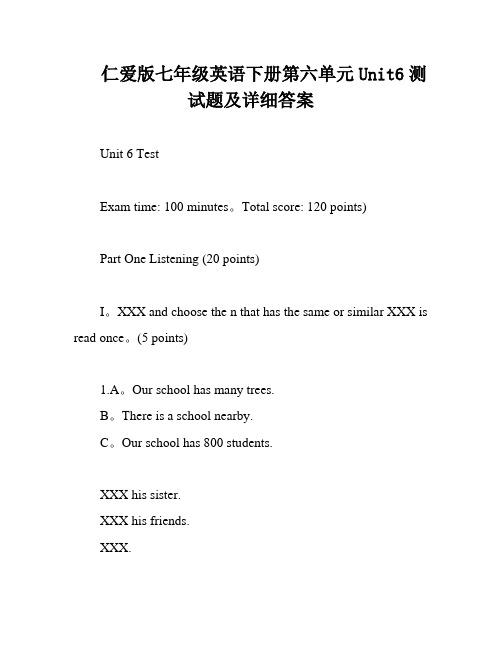
仁爱版七年级英语下册第六单元Unit6测试题及详细答案Unit 6 TestExam time: 100 minutes。
Total score: 120 points)Part One Listening (20 points)I。
XXX and choose the n that has the same or similar XXX is read once。
(5 points)1.A。
Our school has many trees.B。
There is a school nearby.C。
Our school has 800 students.XXX his sister.XXX his friends.XXX.3.A。
Excuse me。
how can I get to the hospital?B。
Excuse me。
could you tell me the way to the post office? C。
Excuse me。
do you work in the post office?4.A。
The parking lot is nearby.B。
There is a parking lot here.C。
There XXX.5.A。
Why not go to the park?B。
Don't go upstairs。
please.C。
Let's go upstairs and have a look.II。
XXX is read once。
(5 points)A。
B。
C。
D。
E6._____。
7._____。
8._____。
9._____。
10._____XXX(5 points)3.The teacher asked us _____ the homework before class. A。
XXX4.My sister is good _____ playing the piano.A。
仁爱版英语七年级下Unit6-Topic1测试题及答案
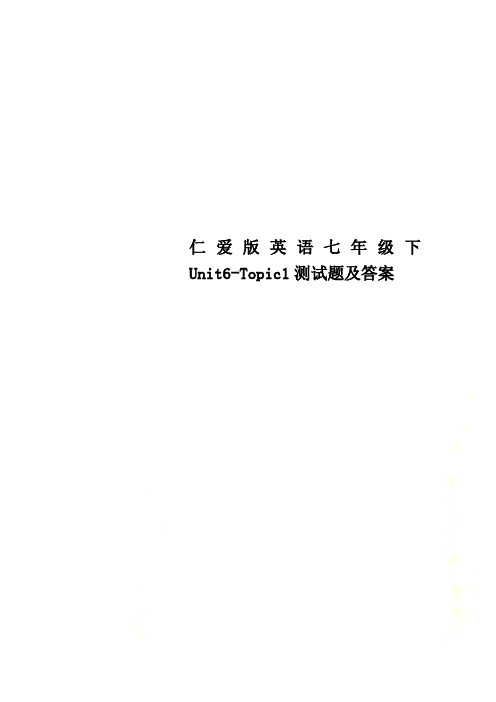
仁爱版英语七年级下Unit6-Topic1测试题及答案仁爱版英语七年级下Unit6 Topic1测试题及答案第一部分听力(20分)Ⅰ. 听句子,选择正确答语。
每个句子读一遍。
(5分)( )1. A. He wants to go to New York City. B. He did his homework.C. He goes to Tokyo.( )2. A. I like it. B. That sounds interesting!C. Have fun.( )3. A. In two days. B. On your holiday.C. In spring.( )4. A. They would be careful. B. Have a good time. C. Good luck!( )5. A. Thank you! B. Yes, I’d like to. C. That’s all right.Ⅱ. 听对话,选择正确图片。
每段对话读一遍。
(5分)A B CD E6. _____7. _____8. _____9. _____ 10. ______________________________________________ ___20. How long did they work there?_________________________________________ ___第二部分英语知识运用(55分)Ⅰ. 单项选择。
(10分)( )1.—What’s your plan for summer holidays, Michael?—I wish _____ Australia and take lots of pictures.A. to travel aroundB. traveling aroundC. to travel forD. travelling for( )2. They are new students and _____ of them _____ a new schoolbag.A. each; haveB. each; hasC. every; hasD. every; have( )3.—When you go on a visit to Beijing, you should’t miss the Great Wall. It’s beautiful.—_____A. It sounds very interesting!B. Why not?C. Thank you all the same.D. I won’t do that again.( )4.—It’s the best time _____ in summer.—You’re right. But don’t go _____ alone.A. to swim; to swimB. swimming; swimmingC. swimming; to swimD. to swim; swimming ( )5.—How are you doing?—_____A. I’m doing my homework.B. I’m going by bus.C. I’m fine, thanks.D. OK. Let me see.( )6. There will be the 18th sports meeting of No. 2 High School next month. The students are busy _____ it.A. to prepare forB. preparing forC. to preparing forD. prepare( )7.—What time did you _____ Beijing?—At about 4:00 p. m. yesterday.A. arrive inB. arriveC. arrive atD. arrived ( )8.—Please _____ animals like tigers in the zoo.—OK, we will, Mr. Lee.A. keep fromB. keep awayC. keep far awayD. keep away from( )9.—Please give my love to your parents, Kangkang.—_____, Michael!A. Thank you very muchB. No problemC. It’s wonderfulD. You’re so cool( )10.—Meimei, could you tell me _____ about Beijing?—Of course.A. anythingB. everyoneC. somethingD. everythingⅡ. 情景交际。
2021年河南省中考英语一轮基础复习课件 仁爱七年级(下) Unit 6
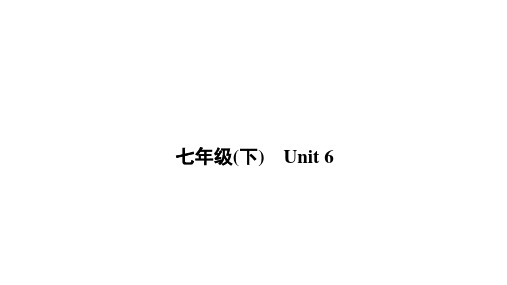
13.__le_f_t_ n. 左,左边 adv. 向左 adj.左边的 14._o_n_l_y_ adv. 仅仅,只有 adj. 仅有的,唯一的 15._q_u__ie_t_ adj. 安静的 16.__n_e_i_g_h_b_o_r__ n. 邻居 ►A good neighbor is better than a brother far off. 远亲不如近邻。 17._c_o_r_n_e_r_ n.(街道)拐角;角 18.__s_u_p_e_r_m__a_r_k_e_t_ n. 超市
►move to 搬到 8.__m__i_ss___(v.)思念;错过(n.)错过 →___m_i_s_si_n_g___(adj.)找不到的;缺少的 9.___fr_e_s_h___(adj.)新鲜的;清新的;新的;淡的;无经验的 10.__a_l_o_n_g___(prep.)沿着,顺着(adv.)(与某人)一道,一起 11.___t_u_r_n__(v.)转弯;(使)变成(n.)转弯;轮流 12. ___c_h_a_n_g_e__(v.)更换;改变(n.)变化;零钱
13.hurt(adj.& v.)→__h_u__rt___(过去式/过去分词)受伤;感到疼痛 14.safe(adj.) →____s_a_fe_t_y__(n.)安全 15.far(adj.& adv.)→____fa_r_t_h_e_r_/f_u_r_t_h_e_r___(比较级)较远的(地) →___f_a_r_th_e_s_t_/f_u_r_t_h_e_st_____(最高级)最远的(地) ►so far 到目前为止
►change into 转换成;把……变成…… 13.___st_o_p___(n.)车站(v.)停止;阻止 →___st_o_p_p_e_d___(过去式/过去分词) ►stop doing sth.停止正在做的事; stop to do sth.停下来去做另一件事; stop sb.from doing sth.阻止某人做某事 14.___li_g_h_t___(n.)灯;灯光(adj.)明亮的;浅色的;轻的(v.)使明亮;点燃 →____li_t/_l_ig_h_t_e_d____(过去式/过去分词)
仁爱七年级下unit6复习课件ppt

·福建省专用
为深入学习习近平新时代中国特色社 会主义 思想和 党的十 九大精 神,贯彻 全国教 育大会 精神,充 分发挥 中小学 图书室 育人功 能
( A )3. —Please turn off the TV,Kitty. Your father
_______. —OK,I will. A.is sleeping C.is watching TV
A.child B.water C.boxes D.girl 3.There were two _____ people at yesterday's meeting . A.hundreds B.hundreds of C.hundred 4.There is _____ in the bag.It's empty. A.nothing B.something C.anything D.somebody 5.There is _____ knocking at the door.Go and see who it is. A.nobody B.somebody C.anybody D.everybody
3 What's the matter?怎么啦?/有什么问题? [点拨] 用来询问某人或某物出了什么问题或什么毛病。表
示具体的人或物出问题时,可以说“What's the matter with sth/sb? ”还可以说“What's wrong with sth/sb?”
What's the matter with your bike, Kate? 凯特,你的自行车怎么了?
为深入学习习近平新时代中国特色社 会主义 思想和 党的十 九大精 神,贯彻 全国教 育大会 精神,充 分发挥 中小学 图书室 育人功 能
Unit6Topic2单元复习课堂练习课件-2021-2022学年仁爱版七年级英语下册

二、用括号内所给单词的适当形式填空, 每空一词。
1. Kids need to spend(花) more time playing __s_p_o_r_ts_ (sport), and less time watching TV. 2. There are always __l_o_t_s__ (lot) of cars at this time of day. 3. We’re __lo_o_k_i_n_g__ (look) for a new house, preferably(最好是) one near the school.
二、根据语境、音标或所给单词的提示完成句子, 每空一词。
1. No talking! We should(应该) keep _q__u_ie_t_ in the library. 2. They don’t have money to buy a house. They can only ______ one. 3. Takrinengtthe exam(考试) is no picnic. I studied for __m__o_n_th__s _ (month) but still failed it.
三、选择填空。
(B )5. —Do you often _______ money in the bank?
—Yes, to save something for a rainy day.
A. make
B. keep
C. take
四、看图写话。
1. between There is a library between the school and the gym./ The library is between the gym and the school.
仁爱版七年级下册英语第6单元测试题

七年级英语下册Unit 6单元测试题Ⅰ.单项选择。
(15分)()1.I have________old pen and my brother has _______ new one.A.a, anB.an, aC.a, a()2. _______there any lamps on the table?A.HaveB.IsC.Are()3.The keys are on the desk. Please __________.A.put them awayB.put away themC.put them on()4.Walk_______this street, and you can see it.A.inB.alongC.on()5.Which is the _________ to the bank?A.wayB.roadC.place()6.There________ some good news the newspaper.A.are, inB.are, onC.is, in()7.—What_________you like ?—I like reading books.A.are, doingB.do, doingC.do, do()8.—_______ does Sally go shopping?—Once a week.A.WhenB.HowC.How often()9.Your friend often __________TV at night.A.watchB.watchesC.watching()10.You can _____ the book for two weeks.A.borrowB.keep C.return()11.—Where ________your neighbor live?—He lives __________ the second floor.A.does, onB.do, onC.do, in()12.The policeman gives the driver a ticket for .A.speedingB.speedC.listening()13.—I’m sorry, I can’t help you now.—_______________.A.Thank you very muchB.Thank for your helpC.Thank you all the same()14.—______________?—The kitchen fan doesn’t work.A.What’s matterB.What the matterC.What’s the matter()15.—What’s a tea house?—It’s a place where you can .A.eat mealsB.buy thingsC.drink teaⅡ.根据句意及汉语提示,完成下列句子。
仁爱英语七年级下模块六 试卷(附答案)

福建省七年级模块六综合检测卷Ⅰ. 听力(共三节,20小题;每小题1. 5分,满分30分)第一节听句子听下面五个句子,从每小题所给的三幅图中选出与句子内容相符的选项。
(每个句子读两遍)( ) 1. A. B. C.( ) 2. A. B. C.( ) 3. A. B. C.( ) 4. A. B. C.( ) 5. A. B. C.第二节听对话听下面七段对话,从每小题所给的A、B、C三个选项中选出正确答案。
(每段对话读两遍)听第1段对话,回答第6小题。
( ) 6. What is behind the door?A. A soccer ball.B. A basketball.C. A baseball.听第2段对话,回答第7小题。
( ) 7. Where is Mandy’s study?A. It’s on the third floor.B. It’s next to the bedroom.C. It’s in front of the bedroom.听第3段对话,回答第8小题。
( ) 8. How far is Lily’s home from the school?A. About four kilometers.B. About five kilometers.C. About six kilometers.听第4段对话,回答第9小题( ) 9. How many rooms are there in the boy’s house?A. Two.B. Five.C. Six.听第5段对话,回答第10、11小题。
( ) 10. Which floor does Mike live on?A. The first floor.B. The second floor.C. The third floor.( ) 11. What kind of house does Nancy live in ?A. Apartment.B. Townhouse.C. Farmhouse.听第6段对话,回答第12、13小题。
- 1、下载文档前请自行甄别文档内容的完整性,平台不提供额外的编辑、内容补充、找答案等附加服务。
- 2、"仅部分预览"的文档,不可在线预览部分如存在完整性等问题,可反馈申请退款(可完整预览的文档不适用该条件!)。
- 3、如文档侵犯您的权益,请联系客服反馈,我们会尽快为您处理(人工客服工作时间:9:00-18:30)。
仁爱版英语七年级下第六单元复习题Ⅰ. 单项选择。
( )1. There _____ a tall tree and some chairs at the back of this community.A. amB. isC. areD. be( )2.—What can you see _____ the left of the yard?—A small garden and some tall trees.A. byB. atC. onD. in( )3.—Could you help me _____ these books to the classroom?—No problem. Let’s go.A. takingB. not takeC. takeD. takes( )4.—_____ bread do we need, Mom?—Two kilos, I think.A. How manyB. How oftenC. How longD. How much( )5.—Do you often _____ your parents?—No, seldom.A. write a letterB. write toC. writes toD. writing to( )6. The old man lives _____ the second floor. He usually goes out for a walk after dinner.A. inB. onC. underD. to( )7.—Where is the teacher’s desk, Kangkang?—Oh, it’s _____ the classroom.A. in the front ofB. in the frontC. in frontD. in front of( )8. Aunt Li isn’t at home. Can you help her _____ her baby?A. look likeB. look afterC. look aroundD. look for( )9.—Where is Guangzhou?—Let’s _____ the map of Chin a.A. have a lookB. have a look atC. lookD. look after( )10. Judy, don’t put your keys here. _____, please.A. Put them awayB. Put up themC. Put them upD. Put away them( )11.—___________—It’s an apartment building.A. What’s your home?B. Where’s your house?C. What kind of house do you live in?D. Where’s the home?( )12.—_______ much water in the glass?—No, only a little!A. Are thereB. There areC. Is thereD. There is( )13.—Would you like me to help you?—_____________A. Sorry, I don’t know.B. No problem.C. This way, please.D. Yes, thanks.( )14. Kangkang’s home is not _____ the school. He usually goes to school on foot.A. far fromB. away fromC. far awayD. far( )15. Look! There are so many students _______ in the pool.A. swimB. are swimmingC. swimsD. swimming( )16.—Do you like living in this community?—Yes, of course. I ________ here!A. had a colorful lifeB. having a colorful lifeC. have colorful lifeD. have a colorful life( )17. The old woman lives _____ a house _____ a garden.A. in; andB. on; withC. in; withD. with; in( )18. We can buy many school things, ________ pens, pencils and rulers in the shop.A. each otherB. such asC. at allD. and so on( )9.—How about playing soccer after school?—I’d love to, but I have _____ homework to do.A. a lot ofB. a lotC. manyD. a few( )20.—Excuse me, this bag is too heavy. ________—Of course.A. Can I help you?B. Could you help me?C. Let’s help him.D. Let me help you.( )21.—Excuse me, how _____ Ren’ai English School?—Go along the street and you will see it.A. I can get toB. can I getC. can I get toD. I can get( )22. The supermarket is across _____ the park.A. toB. inC. fromD. for( )23. _____ right and go down Qiuzhi Street.A. TurnB. TurnsC. To turnD. Turning( )24.—What do your parents do?—They _____ farmers.A. are allB. are bothC. all areD. both are( )25.—Excuse me, where is the bus stop?—Go along this street and you will see it _____ your left.A. atB. onC. inD. for( )26. You can only turn left when you see the sign _____.A. B. C. D.( )27. On weekends, Li Gang always plays computer games _____ it is very late at night.A. afterB. beforeC. untilD. when( )28.—_____ is the hospital from here?—About 10 kilometers.A. How longB. How farC. How oftenD. How many( )29. It’s good _____ old people to cross the road.A. helpB. helpsC. to helpD. helping( )30.—Do I need _____ a bus?—Yes, No. 3 bus will take you there.A. takingB. to takeC. takesD. take( )31.—_____ in your wallet, Madam?—Some money and my ID card.A. Where isB. What isC. What areD. Where are( )32.—Lily, would you like me _____ you?—Yes, thanks.A. helpB. to helpC. helpingD. help at( )33.—Are there _____ boats in the river?—Yes, there are.A. muchB. someC. anyD. little( )34.—_____ milk is there in the bottle?—Little.A. How manyB. HowC. How muchD. What( )35. You can’t turn left when you see the sign _____.A. B. C. D.( )36.—_____ late for class next time.—I’m sorry.A. BeB. NotC. Don’tD. Don’t be( )37. There _____ a ticket, a lamp and some keys on the table.A. areB. isC. haveD. has( )38.—You must _____ those trees and flowers in the garden.—OK, Miss Gao.A. look forB. look afterC. look likeD. look at( )39. The Reads live _____ the end _____ Zhonghua Road.A. at; ofB. in; ofC. at; toD. in; to( )40. There are many students ______ in the apartment.A. liveB. livesC. livingD. lived( )41.—Where are my keys, Dad? I can’t find them.—Look! They’re under the table. You must _____.A. put it awayB. put away itC. put them awayD. put away them( )42. Excuse me, can you tell me _____ Xinhua Bookstore?A. the way toB. the wayC. the road toD. the road( )43.—Can you see many apples _____ the tree?—No, there are a few birds _____ it.A. in; inB. on; onC. in; onD. on; in( )44.—Excuse me, _____ is Zhongshan Park from here?—It’s about seven kilometers.A. how longB. how oftenC. how farD. how much( )45. There is a beautiful garden _____ Kangkang’s house.A.in the front ofB. in the frontC. in frontD. in front ofⅡ. 情景交际。
